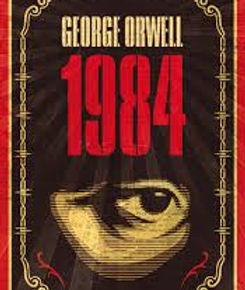Little Shop of Knowledge
1984 by George Orwell
"Who controls the past controls the future. Who controls the present controls the past."
I am amazed at the tremendous power storytelling has had in humanity over time. We may hear about concepts and understand explanations, say on totalitarianism, but nothing will make us grasp the idea of it more than the story of a man’s life under such a regime. Nothing will make us understand the consequences of war better but a picture or a movie that puts us in the feet of someone who is living that situation. Good narrative changes the world.
At the time that 1984 was written, George Orwell could observe the terrible consequences of totalitarianism in places like Germany and the Soviet Union and he sought to communicate this to more people in Great Britain (and hopefully the world) by painting a futuristic vision of their own country under such a regime. In 1984 you se a gloomy version of London, controlled by police forces and filled with people leading miserable lives following ridiculous commands such as watching the daily program of the Government on publicly imposed TV’s (which couldn’t be turned off) and attending “Hate hour”. Sure, ridiculous impositions, however what I think makes 1984 such a powerful novel is the depiction of Winston and Julia’s love story prohibition and sabotage. Any human being can identify with another one who has fallen in love or who cares deeply about someone, and to see reflected in the screen the impossibility of such a beautiful possibility, to see the sabotage of love not because the two persons couldn’t make it work but because somewhere, someone decided that it shouldn’t be allowed, that surely stirs people’s feelings and makes them think twice about the long term consequences of political and economic policies.
"In the end the Party would announce that two and two made five, and you would have to believe it. It was inevitable that they should make that claim sooner or later: the logic of their position demanded it. Not merely the validity of experience, but the very existence of external reality was tacitly denied by their philosophy."
At the beginning of the year we had MPI’s co-founder and president Thor Halvorssen give a speech on the manner in which ideas spread around and political decisions are influenced to the masses. He gave the case of how Hollywood and the leftists with events like Sundance and other film festivals had been strongly influencing the political opinion. A case I truly admired was the increase in the rate of acceptance of Gay Marriage. At the beginning of the decade not even 40% agreed with it, in a timeline Thor demonstrated how with the publication of films like Brokeback Mountain, Milk and The Hours that percentage few to surpass a 90%. Stories, again, prove powerful in bringing people an ideal or a clear vision of what things are/would be like. The main lesson I learned is that we human beings are complex creatures, we cannot understand and fully emphatize with a theory, we need a story, we need to see how a theory is to affect the many aspects of our complex lives. I think this is why film turns so powerful because not only is it demonstrating someone’s own hero journey under the context of a certain perspective but it addresses issues that are tangible and very accessible for the audience to relate to. “You must enter through the heart” says Thor when talking about spreading ideas and sharing with people.
Orwell does this very effectively in 1984, he puts us through Winston Smith’s eyes and we see, hear and feel everything that he lives. From the fret of reading every “Big Brother is Watching You” to the excitement in receiving Julia’s love note to the panic of the thought that Rats would devour your face.
"WAR IS PEACE
FREEDOM IS SLAVERY
IGNORANCE IS STRENGTH"
*** (SPOILER ALERT BEYOND THIS POINT)***
In general I like happy endings, however Orwell ends his novel with complete submission to the regime on behalf of the two strongest characters in the story. Though left with a feeling of anguish and sadness for the characters I think that the effectiveness of such ending is portraying how this miserable way of being too often is the actual stories of people like you and me. The simple thought of it terrifies me and makes me wonder what to do in order to avoid such a regime. The exercise of visualizing oneself in a situation definitely affects the present actions being taken in order to avoid or reach situations.
In this case Orwell offers a dystopia, in Animal Farm he satirizes the USSR’s corrupt and totalitarian system, I believe that ideas to be truly powerful must reach the audience in multiple ways. I was a bit resistant to read 1984 because I didn’t feel that it was literature but due ot the comments I had heard before on it I just felt that it was this author trying to convince me that Totalitarianism is a bad thing rather than an author trying to involve me in a literary lie that would take me through a transformational journey. In the end he did it, he gave me a ride through that Journey and I am thankful with author’s like Orwell because they prove that one can have strong convictions that come across in our literature without turning the literature into mind-washing propaganda.
“Two gin-scented tears trickled down the sides of his nose. But it was all right, everything was all right, the struggle was finished. He had won the victory over himself. He loved big brother.”
